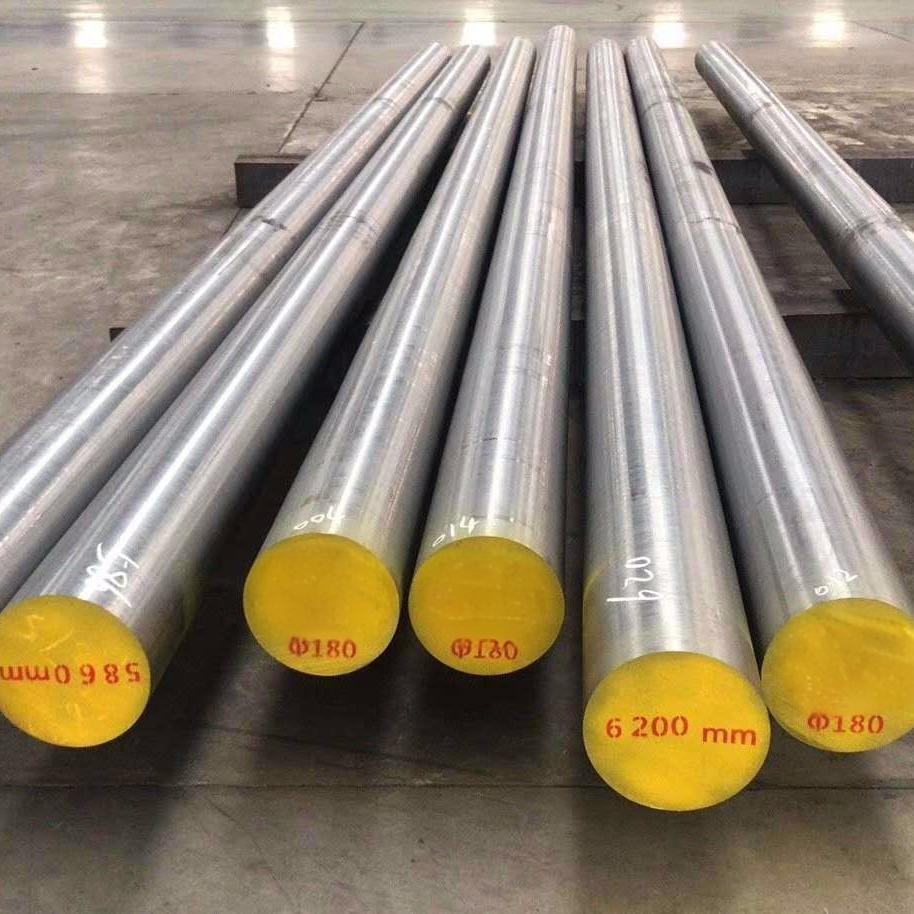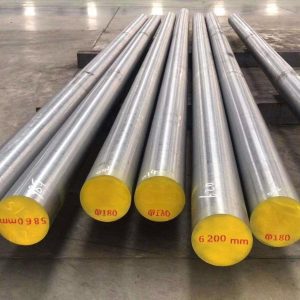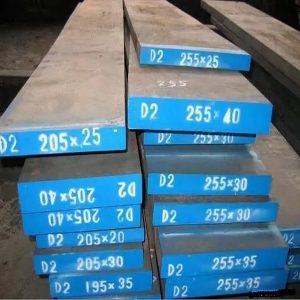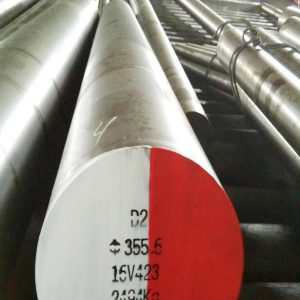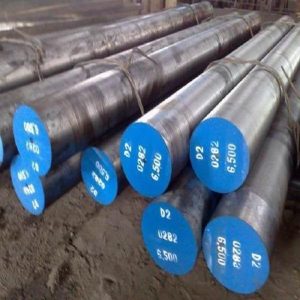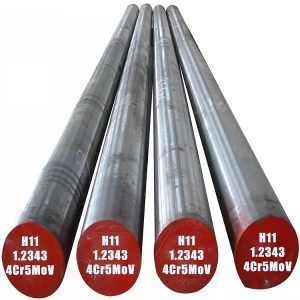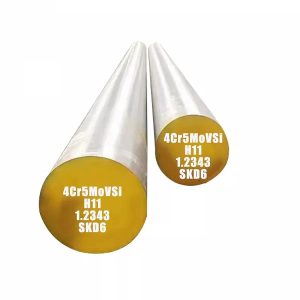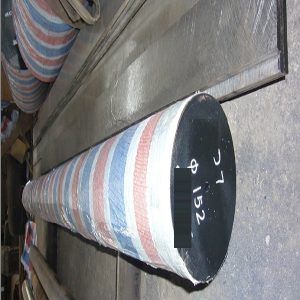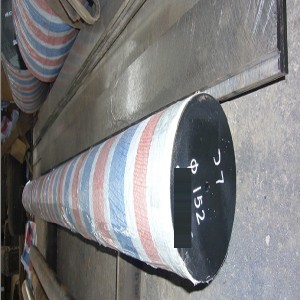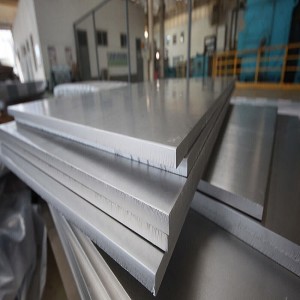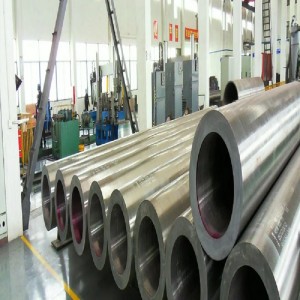China ASTM A681 D7 Tool Steel Bar Manufacturer and Supplier
D7 Tool Steel is a high carbon, high chromium air hardening tool steel with excellent wear resistance.
This wear resistance is mainly due to its high carbon and vanadium content, which form a large number of hard vanadium carbide particles in the steel, with a hardness equivalent to about 80 to 85 Rockwell C.
This property makes D7 tool steel effective in resisting wear when in sliding contact with other steels and in contact with dry and wet slurries of hard abrasive particles such as sand, shot blasting media and ceramics.
D7 tool steel is widely used, mainly including brick mold linings, briquetting molds, shot blasting equipment linings, ceramic extrusion and forming tools, powder compaction tools, deep drawing dies, flattening rollers and machine tool guide rails, etc.
In these application scenarios, the wear resistance, hardness and toughness of D7 tool steel are fully utilized.
In terms of heat treatment, the hardening process of D7 tool steel requires steps such as preheating, austenitization (high temperature) and tempering.
Typical tempering temperature is 300°F (149°C) for maximum wear resistance. Also, for maximum toughness, double tempering can also be performed, holding at a temperature above 950°F (510°C) for two hours and then holding for another two hours.
In terms of cutting workability, the cutting workability of D7 tool steel is about 30-35% of 1% carbon steel. This means that proper tools and techniques are required during the machining process to ensure good machining quality and efficiency.
In general, D7 tool steel is a high-performance wear-resistant tool steel suitable for various application scenarios that need to withstand wear and impact.
Its excellent wear resistance, hardness and toughness, as well as good cutting processability, make it widely used in industrial manufacturing.
D7 tool steel is a high-quality high-carbon, high-chromium alloy tool steel that occupies an important position in industrial production for its excellent physical and chemical properties. This article aims to detail the specifications of D7 tool steel and its main uses.
Main features of D7 Tool Steel
High hardness and strong wear resistance: After proper heat treatment, D7 steel can reach extremely high hardness, giving it excellent wear resistance.
This characteristic makes D7 steel excellent in working environments that are subject to high loads and high-speed friction.
Impact resistance: Due to its high hardness and good toughness, D7 tool steel has good impact resistance and is able to maintain structural integrity when impacted by external forces.
Corrosion resistance: D7 tool steel contains a certain amount of chromium, which allows it to maintain good stability and durability in some corrosive environments.
What are differences between D7 and D2 tool steel?
D7 tool steel and D2 tool steel (also known as Cr12MoV) are two different tool steels, each with unique properties and applications.
D7 Tool Steel is a high carbon, high chromium air hardening tool steel with excellent wear resistance. Its high carbon and vanadium content results in a large number of hard vanadium carbide particles in the steel, with a hardness equivalent to about 80 to 85 Rockwell C.
Therefore, it effectively resists wear caused by sliding contact with other steels and dry and wet slurry contact with hard abrasive particles such as sand, shot blasting media and ceramics. This makes D7 tool steel suitable for a variety of applications, including brick mold linings, briquetting dies, shot blasting equipment linings, ceramic extrusion and forming tools, powder compaction tools, deep drawing dies, flattening rollers and machine tool guide rails.
D2 tool steel (Cr12MoV) is also a high-carbon, high-chromium tool steel with excellent hardness, wear resistance, corrosion resistance and deformation resistance. Its carbon content is as high as 1.40%-1.60%, which improves its hardness and wear resistance.
At the same time, the steel also has high chromium and molybdenum content, which can effectively improve its corrosion resistance.
D2 tool steel can obtain excellent mechanical properties and hardness through heat treatment processes such as quenching and tempering, and has good machinability to meet various machining requirements. These properties make D2 tool steel widely used in the manufacture of high-end parts such as molds, cutting tools and forging dies.
Chemical composition(mass fraction)(wt.%) of the D7 tool steel
| C(%) | Si(%) | Mn(%) | P(%) | S(%) | Cr(%) | Mo(%) | V(%) |
| 2.15~2.50 | 0.10~0.60 | 0.10~0.60 | ≤0.030 | ≤0.030 | 11.5~13.5 | 0.70~1.20 | 3.80~4.40 |
ASTM A681-US
FED QQ-T-570-US
SAE J437-US
SAE J438-US
UNS T30407-US
AISI D7 Tool Steel-US
Smelting Option of D7
1 EAF: Electric Arc Furnace
2 EAF+LF+VD: Refined-smelting and vacuum degassing
3 EAF+ESR: Electro Slag Remelting
4 EAF+PESR: protective atmosphere Electro Slag Remelting
5 VIM+PESR: Vacuum induction melting
Forming Option of D7 Steel
1 Hot rolling process
2 Hot Forging: Electro-hydraulic; High-speed-hydraulic; Oil-hydraulic; Precision-forging
Heat-treatment Option of d7 steel
1 +A: Annealed (full/soft/spheroidizing)
2 +N: Normalized
3 +NT: Normalized and tempered
4 +QT: Quenched and tempered (water/oil)
Suface Option of Tool Steel
1 Black Surface
2 Grounded: Bright but rough ; Not precision
3 Machining for plate: Bright and precision; Little turning scar
4 Peeled/Turned: Bright and precision; Little turning scar
5 Polished: Very Bright and precision size; Not turning scar
MECHANICAL PROPERTIES OF TOOL STEEL D7
| Yield Rp0.2 (MPa) |
Tensile Rm (MPa) |
Impact KV/Ku (J) |
Elongation A (%) |
Reduction in cross section on fracture Z (%) |
As-Heat-Treated Condition | Brinell hardness (HBW) |
| 984 (≥) | 682 (≥) | 41 | 31 | 23 | Solution and Aging, Annealing, Ausaging, Q+T,etc | 322 |
| Products | Diameter(mm) | Length(mm) |
| Rolled Bar | 10~95 | 3000~5700 |
| Forged Bar | 95~440 | 3000~5700 |
| Billet | 130×130,140×140,150×150,160×160 | 7000Max |
